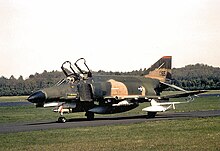| Learn more This article's lead section may be too short to adequately summarize the key points. (September 2017) |
The 313th Tactical Fighter Squadron is an inactive United States Air Force unit. It was last assigned to the 50th Tactical Fighter Wing and stationed at Hahn Air Base, Germany.
313th Tactical Fighter Squadron
 | |
|---|---|
 313th Tactical Fighter Squadron F-16C Fighting Falcon[note 1] | |
| Active | 1942-1945; 1976-1991 |
| Country | |
| Branch | |
| Role | Fighter |
| Part of | United States Air Forces Europe |
| Motto(s) | Lucky 313th Tac Fighter Squadron |
| Engagements | European Theater of Operations[1] |
| Decorations | Distinguished Unit Citation Air Force Outstanding Unit Award Cited in Order of the Day, Belgian Army[1][2] |
| Insignia | |
| 313th Tactical Fighter Squadron emblem (approved 16 November 1942)[1] |  |

History
editWorld War II
editEstablished under the Northeast Air District as a pursuit squadron, initially equipped with second-line aircraft. Transferred to Southeast Air District (later Third Air Force) in late 1941, re-equipped with Curtiss P-40 Warhawks. Trained in the southeast, becoming a training squadron at the Army Air Forces School of Applied Tactics in Florida in 1943.
Re-equipped with North American P-51 Mustangs and trained as an operational squadron, being deployed to the European Theater of Operations, being assigned to IX Fighter Command in England in May 1944. Re-equipped with Republic P-47 Thunderbolts, the squadron supported Allied ground forces in France after D-Day, attacking enemy strong points, troop concentrations, armor formations, bridges and other targets. Moved to Normandy and operated from several forward bases in Northeast France during the summer of 1944 as Allied ground forces moved eastwards towards Germany. Supported the Fifth Army movement from Southern France though the Lyon Valley, then into Occupied Germany as part of the Western Allied invasion in the spring of 1945. Remained in Germany as part of the United States Air Forces in Europe occupation forces, demobilizing over the summer. Inactivated in Colorado, November 1945.
European fighter operations
editReactivated on 15 November 1976 at Hahn Air Base, Germany, but remained nonoperational through 26 December.[3] From this perspective the 313th made a huge jump from P-47 Thunderbolts to the McDonnell F-4E Phantom II. In 1981 the 313th became the first unit to operate the General Dynamics F-16 Fighting Falcon in USAFE. Inactivated at the end of the Cold War on 30 December 1991.
Lineage
edit- Constituted 313th Pursuit Squadron (Interceptor)' on 21 January 1942.
- Activated on 9 February 1942
- Redesignated 313th Fighter Squadron on 15 May 1942
- Redesignated 313th Fighter Squadron (Special) on 28 May 1942[citation needed]
- Redesignated 313th Fighter Squadron, Single Engine c. 21 January 1944[citation needed]
- Inactivated on 7 November 1945[4]
- Redesignated 313th Tactical Fighter Squadron on 1 November 1976
- Activated on 15 November 1976[5]
- Inactivated on 30 December 1991
Assignments
edit- 50th Pursuit Group (later 50th Fighter Group), 9 February 1942 – 7 November 1945[4]
- 50th Tactical Fighter Wing, 15 November 1976[3] – 30 December 1991
Stations
edit- Selfridge Field, Michigan, 9 February 1942
- Key Field, Mississippi, 3 October 1941
- Orlando Army Air Base, Florida, 22 March 1943
- Alachua Army Air Field, Florida, 20 November 1943
- Orlando Army Air Base, Florida, 1 February–13 March 1944
- RAF Lymington (AAF-551),[6] England, 5 April 1944
- Carentan Airfield (A-10),[7] France, 25 June 1944
- Meautis Airfield (A-17),[7] France, 16 August 1944
- Orly Airfield (A-47),[7] France, 4 September 1944
- Lyon-Bron Airport (Y-6),[7] France, 28 September 1944
- Toul/Ochey Airfield (A-96),[7] France, 3 November 1944
- Giebelstadt Airfield (Y-90),[7] Germany, 20 April 1945
- AAF Station Mannheim/Sandhofen (Y-79),[7] Germany, 21 May–June 1945
- La Junta Army Air Field, Colorado, 4 August–7 November 1945[8]
- Hahn Air Base, West Germany, 15 November 1976[5] – 30 December 1991
Aircraft
edit- BT-13 Valiant, 1941-1942
- P-35 Guardsman, 1941-1942
- Curtiss P-40 Warhawk, 1942-1943[1]
- North American P-51 Mustang, 1943-1944
- Republic P-47 Thunderbolt, 1943-1945[1]
- McDonnell F-4E Phantom II, 1976-1981
- General Dynamics F-16 Fighting Falcon, 1981-1991
References
editNotes
edit- Explanatory notes
- ^ Aircraft is General Dynamics F-16C Block 25A Fighting Falcon serial 83-1130, taken in 1986.
- Citations
- ^ Jump up to: a b c d e Maurer, Combat Squadrons, pp. 380-381
- ^ "Air Force Personnel Services: Unit Awards". Air Force Personnel Center. Retrieved 10 September 2017. (search)
- ^ Jump up to: a b Ravenstein, p. 81
- ^ Jump up to: a b Lineage, including assignments, through 1945 in Maurer, Combat Squadrons, pp. 380-381, except as noted.
- ^ Jump up to: a b See Ravenstein, p. 81 (assignment to 50th Wing).
- ^ Station number in Anderson.
- ^ Jump up to: a b c d e f g Station number in Johnson.
- ^ Stations through 1945 in Maurer, Combat Squadrons, pp. 380-381, except as noted.
Bibliography
editThis article incorporates public domain material from the Air Force Historical Research Agency
- Anderson, Capt. Barry (1985). Army Air Forces Stations: A Guide to the Stations Where U.S. Army Air Forces Personnel Served in the United Kingdom During World War II (PDF). Maxwell AFB, AL yes: Research Division, USAF Historical Research Center. Archived from the original (PDF) on 23 January 2016. Retrieved 28 June 2017.
- Johnson, 1st Lt. David C. (1988). U.S. Army Air Forces Continental Airfields (ETO) D-Day to V-E Day (PDF). Maxwell AFB, AL: Research Division, USAF Historical Research Center. Archived from the original (PDF) on 29 September 2015. Retrieved 26 June 2017.
{{cite book}}: CS1 maint: numeric names: authors list (link) - Maurer, Maurer, ed. (1983) [1961]. Air Force Combat Units of World War II (PDF) (reprint ed.). Washington, DC: Office of Air Force History. ISBN 0-912799-02-1. LCCN 61060979. Retrieved 17 December 2016.
- Maurer, Maurer, ed. (1982) [1969]. Combat Squadrons of the Air Force, World War II (PDF) (reprint ed.). Washington, DC: Office of Air Force History. ISBN 0-405-12194-6. LCCN 70605402. OCLC 72556. Retrieved 17 December 2016.
- Ravenstein, Charles A. (1984). Air Force Combat Wings, Lineage & Honors Histories 1947-1977. Washington, DC: Office of Air Force History. ISBN 0-912799-12-9. Retrieved 17 December 2016.